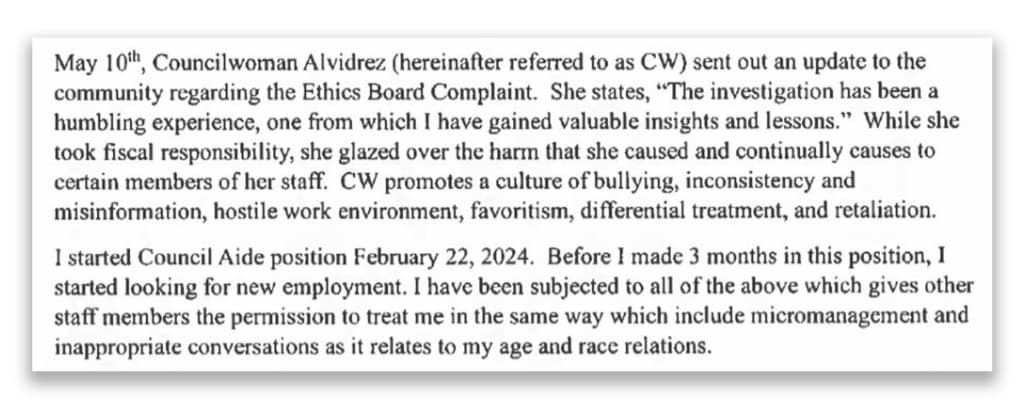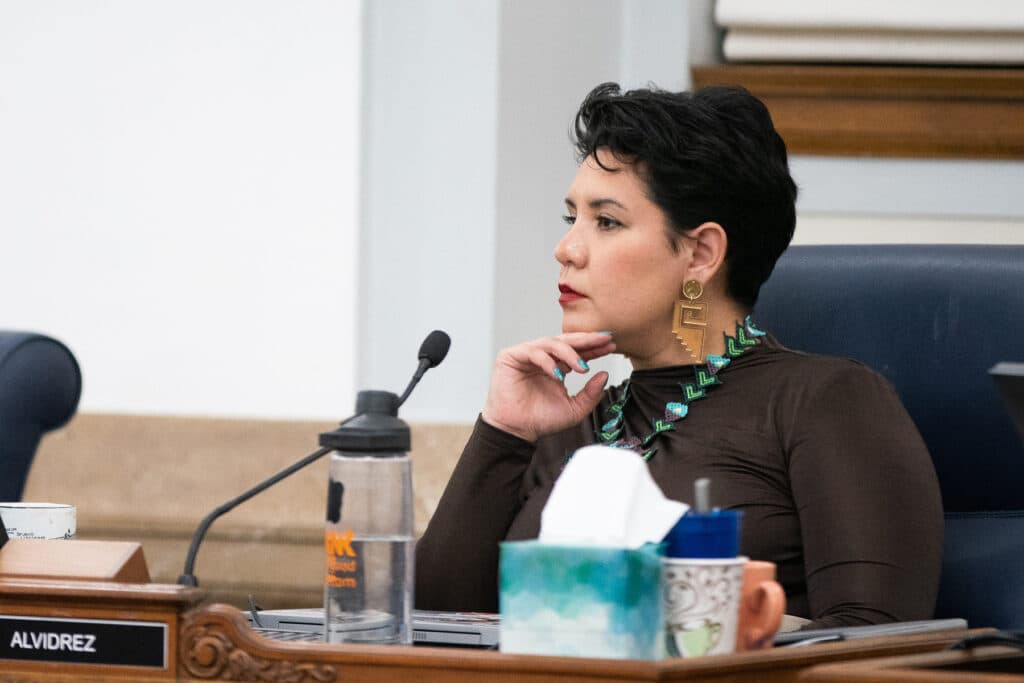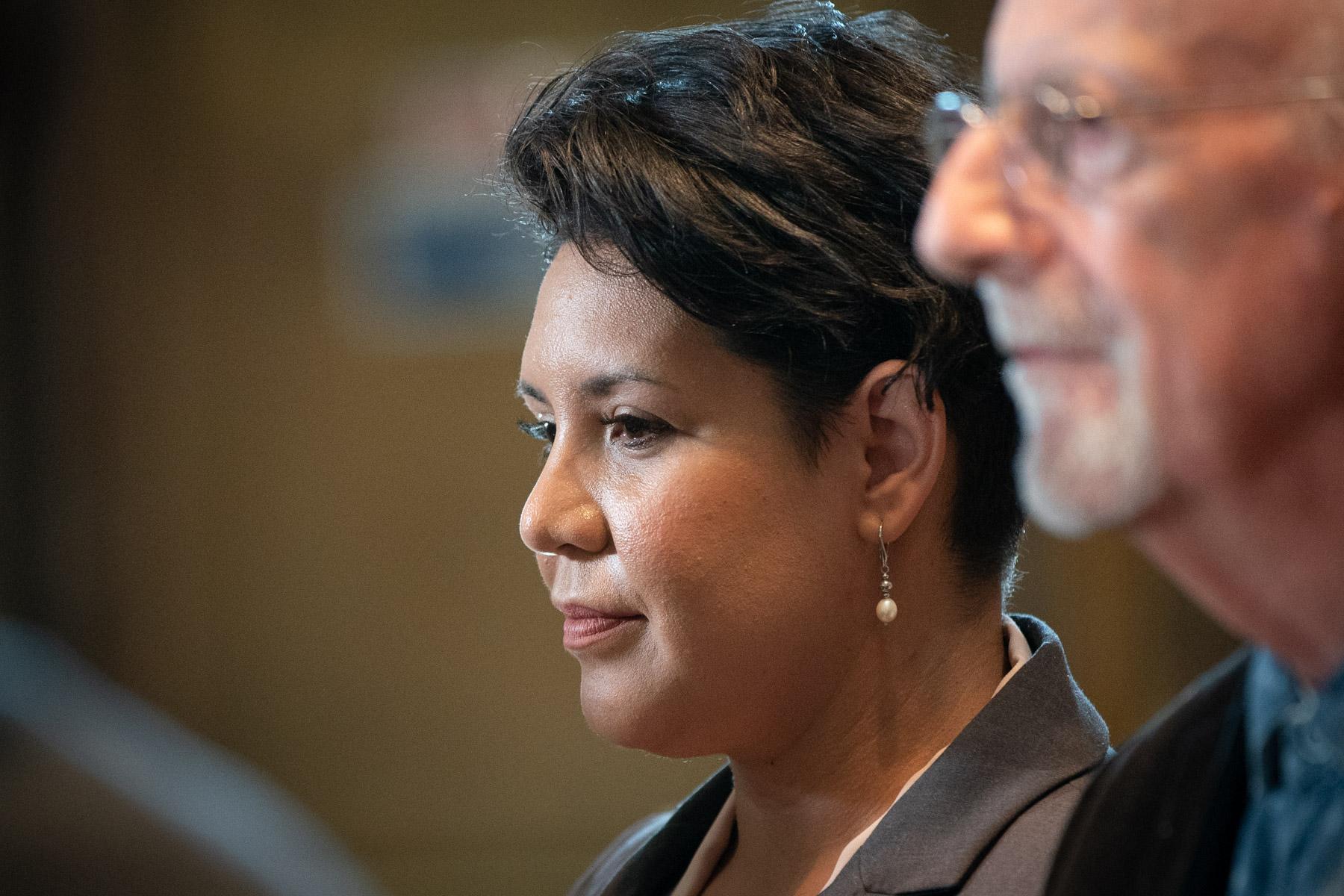One week after an aide for Councilmember Flor Alvidrez complained to human resources about her workplace, she was fired.
She's the fifth aide to leave the office since December. Alvidrez’s four original staff members all quit in December and January after filing complaints about the Councilmember with the council’s human resources staff.
One aide also filed an ethics complaint, which Denver’s Board of Ethics investigated. The board found no violations but did critique Alvidrez’s behavior.
“[Councilwoman] promotes a culture of bullying, inconsistency and misinformation, hostile work environment, favoritism, differential treatment, and retaliation,” Nikki Johnson, the aide who was recently fired, wrote in her complaint to the city, which Denverite obtained through a public records request.
Alvidrez represents District 7, which includes portions of southwest Denver including parts of Ruby Hill, Baker and Speer.
Johnson began the job in February and was fired in June.

“Ms. Johnson was terminated from employment with District 7 for unsatisfactory performance following performance management to support her success,” wrote Mark Montoya, one of Alvidrez’s aides, in a statement on behalf of the office. “However, best practice is for District 7 not to comment on the employment of former employees to avoid further retaliation allegations.”
Johnson had also named Montoya and fellow staffer Jake Yolles in the complaint, alleging that they contributed to the culture of micromanaging and that Yolles made inappropriate comments about race and age.
In a statement to Denverite, Yolles said he did not observe or experience offensive comments about identity or issues like bullying, a hostile work environment, favoritism or retaliation alleged in the complaint.
Denver City Council spokesperson Robert Austin told Denverite that any potential next steps are in the hands of the City Attorney’s Office.
The City Attorney’s Office has not responded to requests for comment.
Because City Councilmembers are elected officials, they have autonomy over how they run their offices, Austin told Denverite in a statement.
In Montoya’s statement to Denverite, he said that he was told that the city was not taking further action in regards to the complaint.
“The City Council and District 7 adhere to a policy of zero tolerance for illegal discrimination and retaliation and take every inquiry regarding alleged illegal conduct seriously,” Montoya wrote. “District 7 was advised that even if all of Ms. Johnson’s unsubstantiated claims were true, the behavior did not rise to the minimum legal threshold necessary for further action.”
In the complaint, Nikki Johnson describes a culture of dysfunction and poor communication in Flor Alvidrez’s office.
Johnson alleges that she was treated differently and felt micromanaged by the Councilmember and other staff.
Like the former aides who filed complaints earlier this year, the staffer described miscommunication around job responsibilities and time off. She also claimed that Alvidrez would add or take away responsibilities as retaliation.
![A screenshot from Nikki Johnson's complaint, reading: "This timeline and attachments are only an excerpt but proof can be found in my outlook, Teams or cell phone of what I have experienced in the 2 months employed with CW. CW has not taken any responsibility for the poor/bullying of staff. She says in her note to the community, she has learned. The only thing she has learned is how to involve other staff in order to ostracize. By ostracizing one person, it gives her protection as the other staff are less likely to cooperate with future investigations as they are involved/implicated in toxic behavior. This is troublesome and downright scary. I shared with her the [REDACTED] that I had experienced, and she has intentionally used as a weapon to prey. It is disheartening, as I really enjoyed working with constituents; however, due to the pattern of bullying that is outlined, I am suffering from and experiencing [REDACTED] with respect to coming into work. Thus, I have had to [REDACTED] to cope with the toxic environment because their behaviors triggering and reminiscent. I cry most days when I leave the office from the micromanagement, differential treatment and the unethical behavior of CW and staff.](https://denverite.com/cdn-cgi/image/width=3840,quality=75,format=auto/https://wp-denverite.s3.amazonaws.com/wp-content/uploads/sites/4/2024/08/flor2-w-background-1024x549.png)
“At these meetings, I am also publicly scolded and humiliated,” the aide wrote in the complaint, referring to team meetings with the Councilmember and her staff.
In a detailed timeline about her four months on the job submitted as part of the complaint, Johnson claims that she was the only staff member required to submit her weekly schedule to the rest of the team.

In a statement to Denverite, Yolles said he himself did not have to submit a schedule to the team or breakdown of tasks, but did report the hours he worked to HR as an hourly employee.
“I never felt micromanaged,” he wrote.
Johnson — who was older than the other staffers and the only Black woman in the office — also wrote in the complaint that others in the office made comments about her age and race. She said she was also subjected to comments about her hair and suggestions that she must be friends with other Black city employees.
![A screenshot from Nikki Johnson's complaint, reading: "5/8 [May 8th, 2024] stayed late for West Denver Connector program - when heading to central office, Jake and I saw [REDACTED] he said oh there goes that African American gentleman I was talking about at the library - do you think he is cute? I did not answer. 5/9 received new business cards - Jake said to me these are the cards we made for old people. Mark was in his office and heard 5/17 at aide's luncheon. Jake was sitting across from me. When he saw [REDACTED] (the African American gentleman as Jake refers to him) he said your friend is here. When I turned around, it was [REDACTED]. I told Jake to stop with this as I have befriended many of the aides and he saw me talking to all of them (who are primarily white) and he said nothing and did not make any reference to any being my friend"](https://denverite.com/cdn-cgi/image/width=3840,quality=75,format=auto/https://wp-denverite.s3.amazonaws.com/wp-content/uploads/sites/4/2024/08/jake1-w-background-1024x457.png)
In a statement, Yolles said he never made or observed comments about Johnson’s race or age in the office.
Johnson also wrote that when she started the job, Alvidrez discouraged her from reaching out to human resources if she had issues at work.
Montoya said the office was unaware of Nikki Johnson’s specific allegations until Denverite’s public records request.
Montoya said that the office worked with human resources for help with Johnson while she was employed there.
“I had numerous conversations with the City Council HR manager seeking advice on coaching Ms. Johnson to improve substandard work performance in the hopes of seeing an improved work relationship,” Montoya wrote in his statement on behalf of the office. “I was made aware that Ms. Johnson was working with the HR manager as well to alleviate some of her concerns. There were no attempts to block Ms. Johnson from speaking with HR. In fact, I asked HR to reach out to Ms. Johnson about her concerns.”
Denverite has reached out to City Council spokesperson Robert Austin for comment on the office’s communications with HR.
This brings the number of human resources complaints about Flor Alvidrez to five.
Johnson’s complaint describes similar experiences of workplace mistreatment to the first four complaints from former members of Alvidrez’s staff, which they made before resigning in December and January.
In those complaints, the aides described miscommunication, retaliation and dysfunction. One aide described Alvidrez using a crude insult in Spanish, something Alvidrez told Denverite she apologized for at the time.
In a statement to Denverite about the first four complaints in February, Alvidrez denied the broader complaints about her management.
"I did not bully my staff, and I did not yell at them,” she told Denverite in February.

Human Resources did not move forward with an investigation into the previous claims because they did not find evidence of discrimination, harassment or retaliation.
But in an internal email between the human resources manager and a former aide, the manager characterized Alvidrez’s behavior as “bullying,” and said Alvidrez admitted to the behavior and agreed to go through additional respectful workforce training.
This isn’t Nikki Johnson’s first time alleging mistreatment and discrimination in a City of Denver workplace.
Johnson came to the role in Alvidrez’s office in February after suing the City Attorney’s Office over claims of pay discrimination and racist behavior in the workplace.
She spent eight years working in the City Attorney’s Office. In July of 2023, Johnson and another Black woman sued the City Attorney’s Office over claims that they were paid less and experienced racism in the office.
"Ms. Johnson and Ms. [Angela] Dunson have suffered repeated bullying from leaders within the CAO [City Attorney’s Office] related to their race," wrote their lawyer Melissa Drazen-Smith in the complaint submitted to U.S. District Court.
The two parties settled the case through mediation and the two women dismissed the claims at the end of 2023.
The new complaint against Alvidrez also claims staff blocked a constituent from commenting on the Councilmember’s Facebook page, which could violate free speech protections.
According to the American Civil Liberties Union, the First Amendment prevents government officials from blocking specific members of the public on social media if their account allows comments.
Earlier this year, the U.S. Supreme Court unanimously ruled that laws around censorship could sometimes apply to elected officials’ personal accounts as well.

In her complaint, Johnson claims that Alvidrez’s staff had turned off comments for one specific constituent on the Councilmember’s Facebook page.
“I’m not sure what this is in relation to,” Yolles said in a statement to Denverite.
Montoya did not comment on questions about the office’s social media accounts.
In addition to the past human resources complaints, Alvidrez was also the subject of an ethics investigation earlier this year.
That investigation was prompted by a former aide who claimed that Alvidrez mishandled public money and retaliated against staff who spoke up.
In one instance, Alvidrez spent nearly $15,000 on two Halloween parade floats, including one made by her ex-husband who co-parents her child.
Alvidrez denied the claims.
In April, the Denver Board of Ethics found that Alvidrez did not violate the ethics code, but said she exhibited a “pattern of apparent reckless use of taxpayer funds” and suggested the city amend its ethics code as a result. Denver City Council has not introduced any amendments to the ethics code since the ruling.












